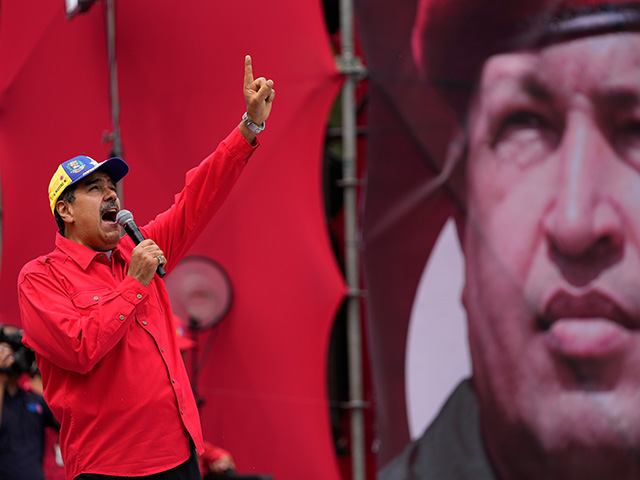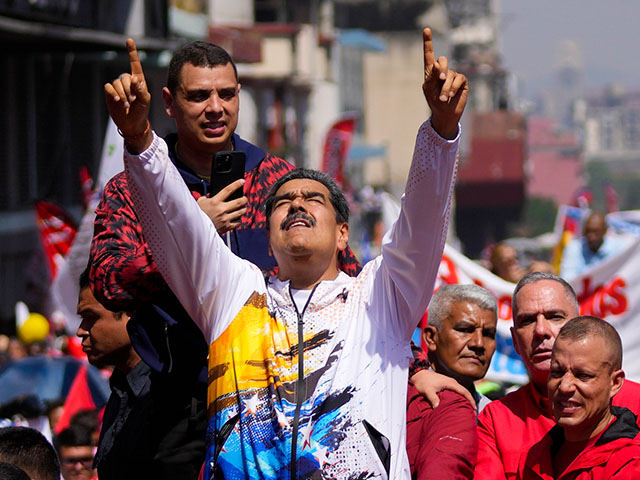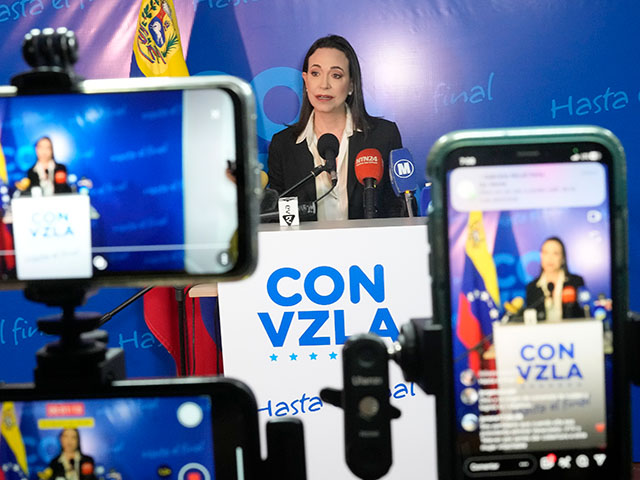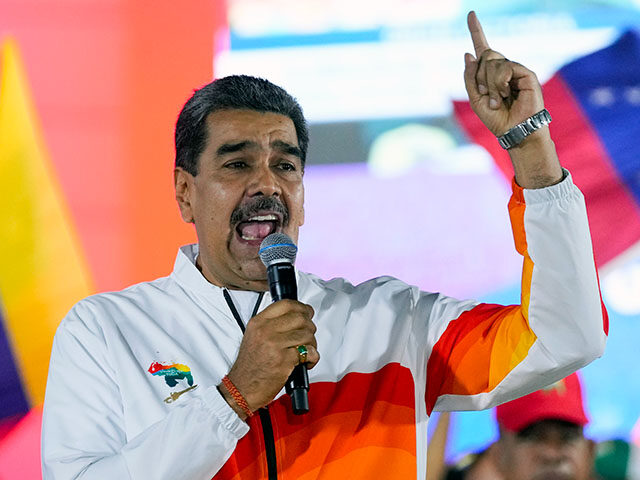Venezuela’s socialist dictator Nicolás Maduro attempted to issue a message in English to U.S. President Joe Biden on Monday to discuss the upcoming expiration of Biden’s generous oil and gas sanctions relief package to his regime.
The dictator’s latest attempt to speak English prompted the laughter of the audience of his weekly television show Con Maduro Más (“With Maduro Plus”), leading to his video going viral on social media platforms.

Venezuela’s President Nicolas Maduro speaks to supporters during an event marking the anniversary of the 1992 failed coup led by late President Hugo Chavez, at the Miraflores Presidential palace in Caracas, Venezuela, on February 4, 2024. (AP Photo/Matias Delacroix)
Maduro — who, prior to becoming Venezuela’s socialist dictator, was his predecessor Hugo Chávez’s foreign minister — has developed a reputation for poor proficiency of the English language. The dictator has issued several “English”-language messages and threats to former Presidents Donald Trump and Barack Obama during their respective administrations.
“I tell the negotiators to tell President Biden the following message,” Maduro said in Spanish, before attempting English: “I you want I want, I you to want I do want.”
Maduro was apparently attempting to invite Biden to a bilateral dialogue.
🇻 | Nicolás Maduro intentó enviarle un mensaje a Joe Biden en inglés y provocó la risa de su propio público.pic.twitter.com/DI9FQ3bP6B
— UHN PLUS (@UHN_Plus) April 16, 2024
After his audience laughed at his English, Maduro decided to translate his message to Spanish in clear “Caraqueño” as a citizen of Venezuela’s capital city of Caracas.
“If you want to, I want to. If you don’t want to, I don’t want to. That’s the end of it,” he clarified, eliciting the applause of his show’s audience.
Biden gifted Maduro and his socialist regime a broad oil and gas sanctions relief package in October. The package rescinded sanctions imposed on Venezuela’s state-owned PDVSA oil company in 2019 during the Trump administration, issued in response to the rogue socialist regime’s human rights violations against its own people.
Biden’s sanctions relief package allows the Maduro regime to once again freely sell Venezuelan oil in U.S. and international markets, leading to a surge in Venezuela’s oil exports and the signing of deals with other countries, restoring the authoritarian regime’s main source of revenue. The sanctions relief package, which has a six-month duration, is set to expire on Thursday.

Venezuelan President Nicolas Maduro points to the sky as he is driven to the National Election Commission (CNE) to formalize his candidacy to run again for president in Caracas, Venezuela, on March 25, 2024. (AP Photo/Matias Delacroix)
President Biden authorized the sanctions relief package after the Maduro regime and the Venezuelan opposition signed an agreement in Barbados that counted with the supervision and endorsement of his administration and Secretary of State Antony Blinken. The agreement contained provisions committing Venezuela’s regime to vague steps toward holding a “free and fair” presidential election sometime during the second half of 2024.
Maduro almost immediately abandoned the agreement, replacing it with a new document drafted by his socialist regime’s lawmakers that established a roadmap for an upcoming sham presidential election on July 28.
Maduro banned the top opposition presidential candidate, María Corina Machado, from that election and all other elections. Her chosen substitute candidate, 80-year-old academic Corina Yoris, was not allowed to register her candidacy.

Opposition presidential hopeful Maria Corina Machado gives a press conference at her campaign headquarters in Caracas, Venezuela, Dec. 15, 2023. Machado has been sidelined from running in the upcoming presidential election by the Nicolas Maduro government. (AP Photo/Matias Delacroix)
As a result, Maduro will “compete” against regime-approved rivals and “opposition” collaborationist figures, effectively securing a new six-year term for himself. The situation resembles Maduro’s actions in 2018, where his regime also held a highly fraudulent election where no opposition candidate was allowed to run.
U.S. officials have indicated the sanctions could be “reimposed” once the relief package expires on Thursday if the Maduro regime fails to commit to a “free and fair” election later this year.
“We made clear that there was another license on their oil industry that was set to expire on April 18th. We are two days from April 18th,” State Department spokesperson Matthew Miller said on Tuesday. “We have been — we have made very clear that if Maduro and his representatives did not fully implement their agreements under the Barbados Agreement, we would reimpose sanctions, and I would just say stay tuned.”
Reuters reported Wednesday that, according to unnamed sources, the Biden administration is considering allowing the Maduro regime to continue selling Venezuelan oil but banning it from using the United States dollar in its oil transactions.
Maduro claimed on Monday that his socialist regime will continue with Venezuela’s “economic growth” with or without U.S. sanctions.
“We are going to continue, with or without a license, we are not a gringo colony,” Maduro said. “Venezuela is going to continue its economic march. Nobody is going to stop us, gringos.”
Christian K. Caruzo is a Venezuelan writer and documents life under socialism. You can follow him on Twitter here.

COMMENTS
Please let us know if you're having issues with commenting.